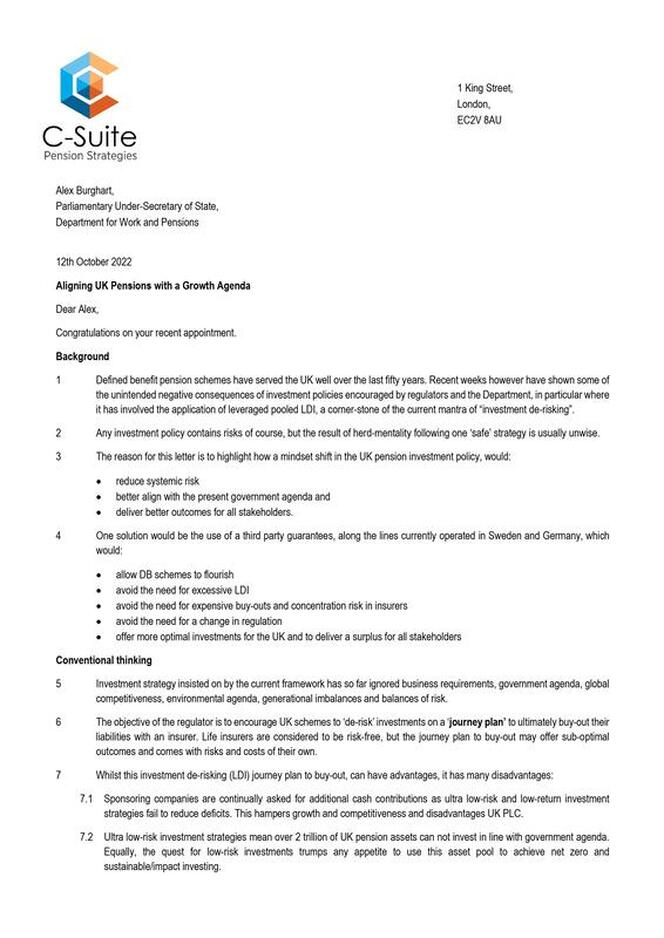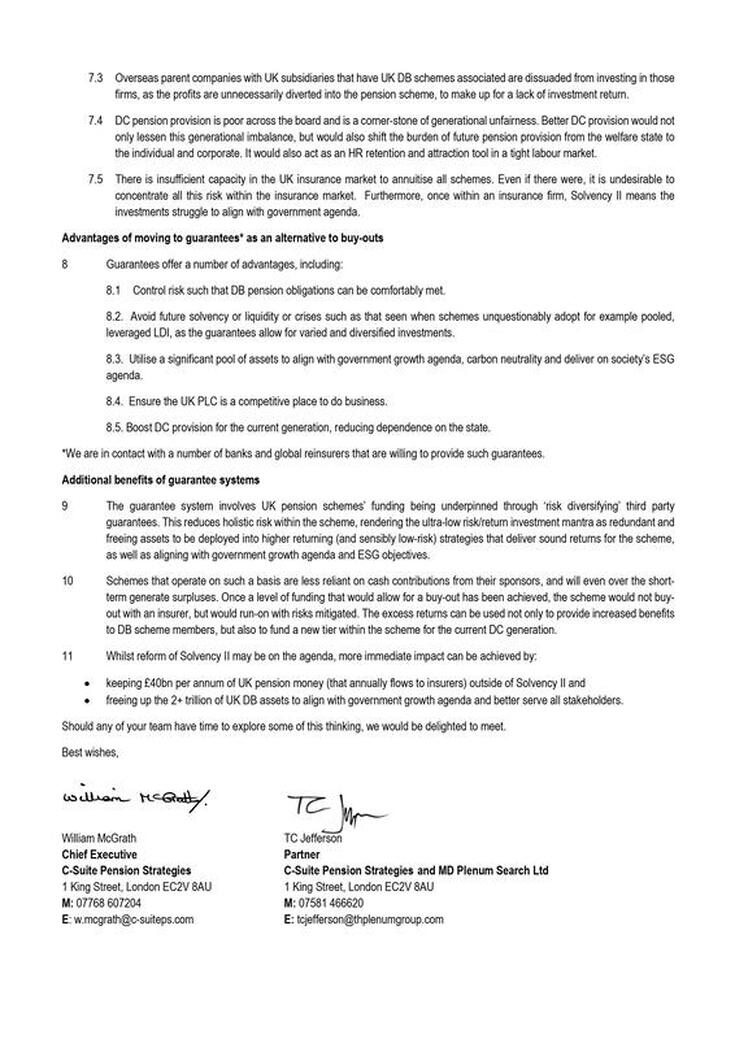|
In addressing Pension Playpen today, William McGrath, founder of C-Suite Pension Strategies suggested LDI problems should inspire scheme trustees and members to consider some awkward questions.
Awkward Questions
“The LDI forced selling fiasco shows up flaws in risk transfer journey plans. Put them on hold. The alternative is for sponsors and former and current employees to embrace their schemes and revive them on a modernised ESG aligned basis to serve long term all stakeholders.” William McGrath w.mcgrath@c-suiteps.com FD Carol Animations have been providing a critique of pension funding for some time: C-Suite Pension Strategies responded to the open consultation
Third-party guarantees of funding levels to provide an opt-out We write in response to the “Draft Occupational Pension Scheme (Funding and Investment Strategy and Amendment) Regulations 2023. The importance of reinforcing progress achieved since Pensions Act 2004 in strengthening funding and governance and reducing investment risk is recognised. The Pensions Scheme Act 2021 and these Statutory Instruments provide the continuum. The premise taken to be is that annuitisation is “the Gold Standard” and the best interest of members is to derisk schemes and to transfer them to regulated insurers. For many schemes that may indeed be the case. A positive growth alternative, however, is also needed. Corporate sponsors have become passive, treating DB pensions as a “legacy problem”. That should change. It is a new era where the schemes themselves have become better funded, where ESG factors are central in Boardroom thinking and recruitment and retention of staff is a core issue. Boards can consider embracing their old DB schemes and reviving them on a modern (C)DC basis with an expectation of adding to the benefits of former and current employees. The ability as a consequence is to address intergenerational unfairness. It is a time when markets have shown that the LDI led derisking of investments brings its own risks. Further discussion with life insurers about Solvency II reforms should highlight the concentration risks involved in driving well funded schemes to buyin and buyouts. Ways to support strong schemes to run on should be attractive to Government on risk diversification criteria alone. The investment strategies of schemes “running on” can also align more closely with Government policy to encourage investment in the UK and emerging sectors. What is needed is greater corporate sponsor engagement. The trigger for change is for corporates to arrange from their own financial resources third party guarantees to address key residual risks for schemes, most notably the solvency of the sponsor itself. The capacity is readily available to major sponsors from insurers and banks. These can be provided in exchange for a new, long term investment strategy; clarity on actuarial assumptions and the revival of the scheme. The Regulations subject to consultation and the forthcoming Funding Code can support that adjustment in objectives. Our comments here are not designed to critique the Regulations themselves. These have already received much in depth analysis of which the Department / TPR will be aware. The aim here is to provide for schemes and their sponsors an alternative way forward. By providing greater certainly of available support, backed by third party institutions, the drive to derisk investments further and exit stops. The idea introduced is of “Sustainable Low Dependency” (SLD). Guarantees provided mean that “significant maturity” is not reached. Guarantees mean that the work on the corporate covenant is radically reduced. The ability to provide the guarantees provides corroboration. The strategy for the scheme is reset to “run on” and with it new mechanisms to enhance pension provision for former and current employees of the sponsor. The SLD approach compliments the Low Dependency approach. Guarantees ensure the latter is met now more rapidly. SLD then provides an “opt out” to decommissioning. The scheme is revived on a new basis and is looking to have a long term positive role. SLD works well alongside the proposed regulations. That there is a clear alternative makes their detailed impact of reduced concern. Indeed, trustees may take the unwillingness or inability of sponsors to provide SLD as a lead indicator that the drive to derisk further is needed. We see the introduction of guarantees as being a corporate initiative which is then handed through the schemes Integrated Risk Management processes to ensure the new strategy works well in all stakeholders’’ interest. We see larger sponsors and well funded schemes as being particularly relevant to the approach proposed. Schemes which can pass a “Gateway Test” for superfund analysis should certainly look at it as an option. The “new money” introduced supports TPR’s role as guardian of the PPF. The amendments provide an alternative which enhances the core approach already set out and produce overall a better balanced proposal. The past is better aligned in a positive approach to the support of future pension provision. Questions and Answers for the Changed Pensions Landscape: Should Sponsors be Encouraged to Stay?11/10/2022
Members should consider their position in the current system and revolt. The position of C-Suite Pension Strategies is that corporate sponsors need to “get stuck in”. The industry is not working in either their or in scheme members’ best interests. The 2004 Pensions Act introducing TPR and PPF was a success. Higher cash funding and derisking have left many schemes well placed. Schemes should now be revived on a modernised (C)DC basis. The trigger for change is the ESG commitment of Boards and the risks in greenwashing. Pension funding strategies provide excellent test cases of rhetoric against reality. At the same time members should revolt. With inflation higher than most scheme increase caps, then annuitisation is not a path to “peace of mind”. Overall “endgame” thinking is inappropriate. It is not the End: it is not a Game. A change in the premise of corporate sponsors to embrace from “get risk ASAP” can be transformational, showing how it is not too late for many sets of trustees to reengage with members and provide them with better outcomes. |
Archives
April 2024
|
C-Suite Pension Strategies Ltd
80 Coleman Street, London EC2R 5BJ
Registered in England and Wales
Company No. 09974973
80 Coleman Street, London EC2R 5BJ
Registered in England and Wales
Company No. 09974973




 RSS Feed
RSS Feed